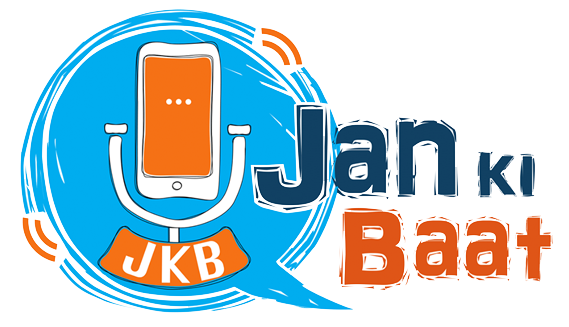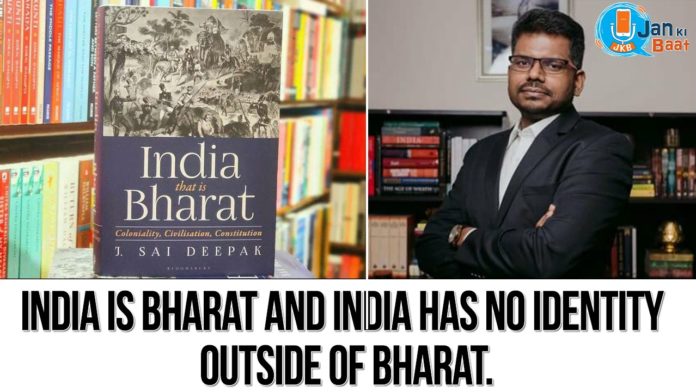Supreme Court Counsel J Sai Deepak speaks to JAN KI BAAT’s Debarghya Banerjee on his book ‘India that is Bharat: Colonialiality, Civilization, Constitution’
Read the Interview here :
Debarghya Banerjee: What was the main motivation for you to write this book? Did the Sabarimala issue bother you in a way? Does your active interest in Hindu culture & tradition play a part behind the writing of this book?
J. Sai Deepak: The primary motivation behind writing this book was to capture the common underlying issue that afflicts Bharatiya consciousness through a well-established school of thought, namely coloniality, and apply it specifically in the realm of the Constitution. Since the Constitution has become the battleground of ideologies, I wanted to examine the relationship between the Indic civilisation and the Constitution. My experience in matters such as the Sabarimala Temple entry case and the Sree Padmanabhaswamy Temple case certainly played a significant role in pushing me towards understanding the larger issue better. As a practising Hindu, I certainly wanted to understand if the Constitution is or has become at loggerheads with my civilisation and my way of life as is often made out to be.
Debarghya Banerjee: Why this title of the book?
J. Sai Deepak: Because India is Bharat and India has no identity outside of Bharat. Without Bharat, India would wither away and become a vassal of the West. And also, because the Constitution itself begins with India that is Bharat in Article 1, which is often forgotten by “Constitutional patriots”.
Debarghya Banerjee: You’ve earlier spoken quite a bit in your articles about what your thoughts are on the dharma or civilizational ethos that Bharat represents. Was the book similar in its prospects? Is it an inherent study on the colonial literature?
J. Sai Deepak: My earlier articles were meant to be exploratory in nature both in terms of the subject and the reception of the readers. Therefore, while there is a thematic overlap between the articles and the book, the book goes much deeper into the subject and presents both facts and opinions which were not remotely covered by the articles. More than colonialism, the book deals with “coloniality” which translates to the thought or the logic that drives colonialism.
Debarghya Banerjee: Do you think there’s a need to rewrite India’s history, obviously not the whole but a few parts of it? How much role do you think should Indian scholars have on it?
J. Sai Deepak: Actually I believe that Bharat Studies needs a complete overhaul and not a minor surgery, and this is not limited to history alone. It applies to history, political science, economics, nature, religion, language, law and more. Bharatiya scholars have a huge task cut out for themselves to decolonialize (which is different from decolonize) the way Bharatiyas see their own heritage.
Debarghya Banerjee: The second part of your book deals with the impact of European colonisation on India. If you’ve to mention one most important impact, what would that be?
J. Sai Deepak: Dharma, Prakriti/Nature and knowledge- all are connected and therefore have been individually and collectively affected.
Debarghya Banerjee: Will you call your book an amalgamation of study on history, political science, impact of postcolonial literature & an idea of ‘Shrestha Bharat’?
J. Sai Deepak: My book is an amalgamation of history, political science, civilisational studies and constitutionalism. The goal is Punarnirman, not Navnirman because the former believes that there is a lot of value in Bharat’s past whereas the latter believes that Bharat is better off by severing its ties with its past.
Debarghya Banerjee: Do you think there was a desperate attempt by few to admonish the reawakening of Hindu renaissance? Do you think there was a role played by political parties in it?
J. Sai Deepak: Dharmic intellectual resistance was alive until 1947 but was systematically marginalized, stereotyped and silenced by the Nehruvian Marxist clique whose contempt for all things Indic is best reflected in its own portrayal of Bharat in history textbooks.
Debarghya Banerjee: A lot has been said on the rise of the aggressive brand of Hindutva. Does your book settle the matter in a way?
J. Sai Deepak: My book attempts to make the case that what is crudely dubbed as Hindutva or Hindu Nationalism is nothing but a decolonial Dharmic civilisational reawakening which every self-respecting society has the right to, especially after being subjected to three waves of colonisation, Middle Eastern, European and Nehruvian Marxist.
Debarghya Banerjee: What would be the message to our readers as most of them are enamored by your plain speak?
J.Sai Deepak: Even if your preconceived notions of Bharat’s history compel you to reject the perspectives offered in my book, at least keep an open mind to the facts and ask yourself as to what conclusion should any reasonable mind arrive at when presented with such facts.
Readers in Pune, visit Solanki Booksellers and @crossword_book this Sunday where @jsaideepak will be signing copies of #IndiaThatIsBharat pic.twitter.com/kmoqRJZQcZ
— Bloomsbury India (@BloomsburyIndia) October 14, 2021

